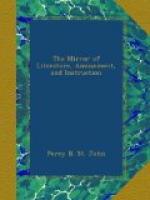My friend, the surgeon, bade us, however, not despair. When the man of influence arrived he hoped to prevail; and in the mean time he led us to view the other curiosities of Bicetre. There was the well, the kitchen, the anatomical theatre. The courts were crowded with aged paupers, who each well knew that his carcass would undergo what laceration the scalpel of my friend and his comrades chose to inflict upon it. But the thought seemed not to affect them so much as it did us. Methought the business of dissecting dead subjects might have been carried on more remote from the living candidates; but I was wrong, for mystery and secrecy always beget fear.
The mad-house was another curiosity. It contains many whose brain the revolution of July, 1830, had turned. One man, a fine youth, had travelled on foot from a distant part of the kingdom, to shed his blood as a sacrifice to the memory of Napoleon. He gave his last franc to obtain admission within the pillar of the Place Vendome, and when there opened the veins of both his arms, crying out, “I offer the blood of the brave to the manes of Napoleon.” His rolling black eye was now contrasted with a face pale as death. He had lost so much blood that few hopes were entertained of his recovery.
But by far the most curious patient of the mad-house, was a young man who imagined himself to be a woman. He was handsome, but not feminine in appearance. He adored a little mirror, with which he was gratified. Rags of all colours were his delight; and he had made a precious collection. His coquetry was evident; and he answered pertinently all questions, never belying at the same time his fixed opinion, that he was endowed with a maiden’s charms.
We looked over the book of reports, and found seven-eighths of the female patients to have become deranged from love; whilst, with the majority of the males, the hallucination proceeded from disappointments of ambition. Surprised, I could make out no case of a religious maniac; glad, I could discover none of a student.




